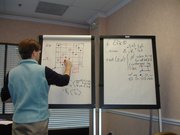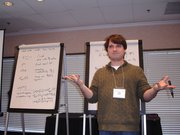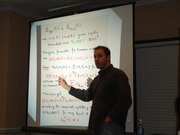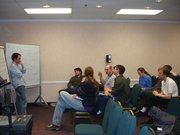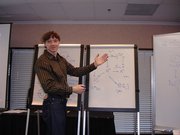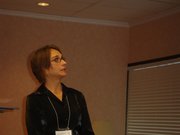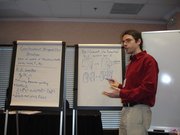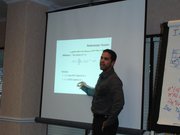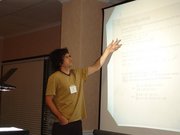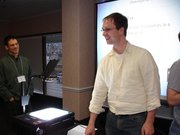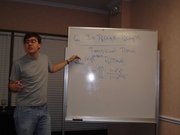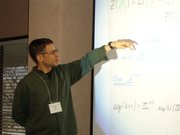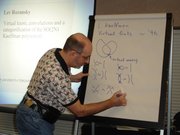CMS Winter 2006 Session on Knot Homologies: Difference between revisions
From Drorbn
Jump to navigationJump to search
m (Reverted edit of 81.177.14.26, changed back to last version by Drorbn) |
m (Reverted edit of 81.177.14.26, changed back to last version by Drorbn) |
| (7 intermediate revisions by 2 users not shown) | |
(No difference)
| |
Latest revision as of 14:48, 27 February 2007
This is an information page for the session on Knot Homologies in the Canadian Mathematical Society Winter 2006 Meeting in Toronto.
Meeting Log
Saturday December 9, 2006
Sunday December 10, 2006
Dror's Lecture Evaluation Form: PDF, ODT.
Monday December 11, 2006
Peter Lee's handout - front:  , back:
, back:  .
.
Our Schedule
Saturday December 9, 2006 | |
| 09:00-09:50 | Plenary Lecture: Karen Smith |
| 10:15-12:15 | Lipshitz (1), Seidel (1) |
| 13:45-14:35 | Prize Lecture: Andrew Granville |
| 16:00-18:00 | Collin (1), Kamnitzer (1) |
| 18:00-18:30 | Adrien-Pouliot Lecture |
| 18:30-19:30 | Participant's Social |
| 19:30-20:30 | Public Lecture: V. Kumar Murty |
Sunday December 10, 2006 | |
| 08:30-10:00 | Khovanov (1), Caprau (1/2) |
| 10:15-11:15 | D. Thurston (1) |
| 11:15-12:05 | Plenary Lecture: Susan Tolman |
| 13:45-14:35 | Doctoral Prize Lecture |
| 14:45-15:35 | Plenary Lecture: Dimitri Shlakhtenko |
| 16:00-17:30 | Ortiz-Navarro (1/2), Naot (1/2), Todd (1/2) |
| 18:00-19:00 | Reception |
| 19:00-22:00 | Banquet |
Monday December 11, 2006 | |
| 08:30-10:00 | Rasmussen (1), Lee (1/2) |
| 10:15-11:15 | Rozansky (1) |
| 11:15-12:05 | Plenary Lecture: Dmitry Dolgopyat |
| 13:45-14:35 | Plenary Lecture: Shmuel Weinberger |
| 14:45-15:45 | Knot Homologies: Open discussion |
| 16:00-18:00 | Knot Homologies: Open discussion |
(The 1 hour long lectures are really 50 minutes + 5 minutes questions + 5 minutes break. The 1/2 hour long lectures are really 25 minutes + 4 minutes questions + 1 minute break).
Our Speakers
1. Carmen Caprau (Iowa, maybe just Sat-Sun) - half hour on An [math]\displaystyle{ sl(2) }[/math] tangle homology for dotted, seamed cobordisms. Abstract:
- We construct an [math]\displaystyle{ sl(2) }[/math] Bar-Natan like tangle homology for dotted, seamed cobordisms with [math]\displaystyle{ {\mathbb Z}[a] }[/math] coefficients. This theory is functorial under link cobordisms. In the case of links, a version of the original Khovanov Homology corresponds to the choice [math]\displaystyle{ a=0 }[/math]. Likewise, for [math]\displaystyle{ a = -1 }[/math] we recover Lee's theory.
2. Olivier Collin (UQAM) - one hour on Non-trivial actions on Floer homology. Abstract:
- Given a finite order orientation-preserving diffeomorphism [math]\displaystyle{ t:Y^3\to Y^3 }[/math] of an integer homology sphere [math]\displaystyle{ Y^3 }[/math], it is an interesting and difficult general problem to understand the effect of the induced map on instanton Floer homology. In this talk, we consider odd-order diffeomorphisms of integer homology sphere and their induced effect on [math]\displaystyle{ SU(2) }[/math]-character varieties and Floer homology. We are interested in cases where the resulting equivariant Casson invariant differs from the Casson and the consequences for finding non-trivial actions on Floer homology. This provides the first examples of non-trivial odd-order actions on the Floer homology of irreducible homology spheres. We shall also see how this can be related to the existence of incompressible surfaces in the 3-manifold [math]\displaystyle{ Y^3 }[/math]
3. Joel Kamnitzer (MIT) - one hour on Knot homology via derived categories of coherent sheaves. Abstract:
- We will give a construction of a knot homology theory using the derived category of coherent sheaves on a certain variety arising in geometric representation theory.
4. Mikhail Khovanov (Columbia) - one hour on Braid cobordisms and triangulated categories. Abstract:
- We review known actions of the braid group on triangulated categories and their extensions to representations of the category of braid cobordisms.
5. Peter Lee (Toronto) - half hour on Closed-Form Associators in a "Toy" Quotient. Abstract:
- In the theory of finite-type invariants of knots, a key objective is to construct a "universal finite-type invariant", which takes values in a certain target space of chord diagrams. Construction of such a universal invariant can typically be reduced to determining its value on a particular kind of tangle, which represents a sort of "associativity" property. This value is usually referred to as an "associator", and it is hoped that finding an explicit expression for such an associator could offer significant knot-theoretic insights. In general, however, finding associators has proved to be an extremely difficult problem.
- In this talk I will discuss how a closed-form associator can be constructed in a particular "toy" quotient of the usual target space, which may ultimately help us to construct associators in more general target spaces.
6. Robert Lipshitz (Columbia) - one hour on Some recent developments in Heegaard-Floer homology. Abstract:
- We will discuss some recent developments in Heegaard-Floer homology-progress on making it combinatorial and attempts to generalize it.
7. Gad Naot (Toronto) - half hour on The Universal Khovanov Link Homology Theory - Extracting Algebraic Information. Abstract:
- In this talk I will introduce the universal Khovanov link homology theory ([math]\displaystyle{ n=2 }[/math]). This theory is developed using the full strength of the geometric formalism of Khovanov link homology theory and has many computational and theoretical advantages. The universal theory answers questions regarding the amount of algebraic information held within the complex associated to a link. It also answers questions regarding the extraction of this information by giving full control over the various TQFTs applied to the complex (along with control over other gadgets such as the various spectral sequences related to these TQFTs). After a brief overview and some reminders I will introduce the major tools and ideas used in developing the universal theory (such as surface classification, genus generating operators, complex isomorphisms and "promotions"). Then, I will present some of the advantages of such a theory, time permitting (more on the topic can be found at arXiv:math.GT/0603347).
8. Juan Ariel Ortiz-Navarro (Iowa, maybe just Sat-Sun) - half hour on Khovanov Homology & Reidemeister Torsion. Abstract:
- The Reidemeister Torsion construction can be applied to the chain complex that is used to compute the Khovanov homology of a knot or a link. This defines a volume form on Khovanov homology. The volume form transforms correctly under Reidemeister moves to give an invariant volume on the Khovanov homology. We use this to study the invariants of knots.
9. Jake Rasmussen (Princeton) - one hour on Stable KR-homology of torus knots. Abstract:
- Computer calculations suggest that the limiting behavior of the Khovanov homology of [math]\displaystyle{ T(m,n) }[/math] as [math]\displaystyle{ n\rightarrow\infty }[/math] is rather complicated. In contrast, the corresponding limit for the HOMFLY homology of [math]\displaystyle{ T(m,n) }[/math] is quite simple. I'll describe how to calculate this limit and explain why the result provides evidence for the presence of a symmetry in the HOMFLY homology.
10. Lev Rozansky (UNC) - one hour on Virtual knots, convolutions and a categorification of the [math]\displaystyle{ SO(2N) }[/math] Kauffman polynomial. Abstract:
- This is a joint work with M. Khovanov. We present a categorification construction for the [math]\displaystyle{ SO(2N) }[/math] specialization of the Kauffman polynomial and prove its invariance under the first and second Reidemeister moves. The construction follows the Kauffman-Vogel alternating sign formula, which expresses the Kauffman polynomial of a link in terms of polynomials of 4-valent planar graphs. We define the matrix factorization associated to the 4-vertex as a convolution of a chain of two saddle morphisms, relating parallel and virtually crossing pairs of arcs.
11. Paul Seidel (MIT, in Saturday and Sunday morning) - one hour on Localization in Floer homology and applications. Abstract:
- I will explain how to construct localization maps for Z/2-actions in Floer theory, and how this explains the relation between the symplectic version of Khovanov homology and Ozsvath-Szabo theory.
- This is joint work with Ivan Smith.
12. Dylan Thurston (Barnard and Columbia, in Saturday and Sunday) - one hour on Combinatorial Heegaard-Floer Homology and Legendrian knots. Abstract:
- We describe a completely combinatorial definition and proof of invariance of Heegaard-Floer homology for links in the 3-sphere. We will show how to extract invariants of Legendrian and transverse links with values in in this homology.
13. Robb Todd (Iowa, maybe just Sat-Sun) - half hour on Khovanov Homology and the Twist Number of Alternatinng Knots. Abstract:
- O. Dasbach and X.-S. Lin showed that the sum of the absolute value of the second and penultimate coefficient of the Jones polynomial of an alternating knot is equal to the twist number of the knot. Here we give a new proof of their result using a variant of Khovanov's homology that was defined by O. Viro for the Kauffman bracket. The proof is by induction on the number of crossings using the long exact sequence in Khovanov homology corresponding to the Kauffman bracket skein relation.
Letters to the Speakers
Another Accommodation Note
A good further list of places to stay is at http://www.fields.utoronto.ca/resources/housing.html.
5th Letter
Dear Speakers, I've posted a tentative schedule for the upcoming CMS meeting in Toronto on our session's web site, at http://katlas.math.toronto.edu/drorbn/index.php?title=CMS Please find yourself there and make sure you are ok with it! Poor Mikhail and Jake are scheduled for early morning talks; this perhaps can be changed, but I think they (and the rest of us) will survive this and gain some free time Monday afternoon which you can use either to fly home earlier or to join for an "open discussion". I hope you'll all choose the latter; I think there will be value to that discussion. Reminders: Travel Arrangements!! Hotels before Nov 15! Reduced rate registration by Nov 5! Tell me about your technology needs! Best, Dror.
4th Letter
Dear Speakers, A few reminders regarding the upcoming "Knot Homologies" session in Toronto - 1. You need to buy tickets and arrange accommodations! See my "2nd Letter" at http://katlas.math.toronto.edu/drorbn/index.php?title=CMS and also the "Accommodations Note" there. 2. The deadline for reduced-rate registration is November 5. Please register and keep the receipt, though remember that our budget is tiny so it won't cover much more than the registration... 3. If you'll need any special equipment for your talk, my deadline to request it is Friday November 3rd, so please tell me about it soon. In our lecture room we will have an overhead projector, a screen and a white board. Computer projectors must be booked now. 4. MOST IMPORTANT: If you haven't submitted your title and abstract yet, please do so ASAP, and also send a copy directly to me. I need to prepare the schedule for our session by next Friday (Nov 3), and my plan is to do it next Wednesday. It will be better if I'll know what you are planning to talk about! This applies to Caprau, Collin, Lee, Morrison, Naot, Ortiz-Navarro, Rasmussen, Rozansky and Todd. Your Obedient Servant, Dror.
Accommodations Note
If you're still looking for accommodations, I would definitely take a look at http://www.baldwininn.com/. A new place so no feedback yet, but the location is fantastic.
3rd Letter
Shalom Speakers and Potential Speakers, A quick reminder - the powers above me request that you submit your abstract by October 15 (i.e., in about two days) at http://www.cms.math.ca/Events/winter06/announce.e#abs_sub. The punishment for not doing so will be that your abstract may not appear in the official program. This of course will not prevent it from appearing on our "internal" wiki site. Also, visit our internal site at http://katlas.math.toronto.edu/drorbn/index.php?title=CMS for the most up-to-date list of speakers. Lehitraot, Dror.
2nd Letter
Dear Speakers and Potential Speakers, A few more words about the CMS Winter 2006 Session on Knot Homologies in Toronto on December 9-11 - As I wrote on the initial invitation, we only have a tiny budget to run this session - about $3,000 to divide between around 10 speakers. This means very little for each one of you, I'm afraid. If this scares you out, say so now and don't hold a grudge against me later! On the other hand, I think we have an excellent group of speakers (see http://katlas.math.toronto.edu/drorbn/index.php?title=CMS), so the meeting itself should be FUN. Now for the technicalities - 1. The powers above me request that you submit your abstract by October 15 (i.e., in about two weeks) at http://www.cms.math.ca/Events/winter06/announce.e#abs_sub. The punishment for not doing so will be that your abstract may not appear in the official program. This of course will not prevent it from appearing on our "internal" wiki site. 2. You are requested to register at http://www.cms.math.ca/Events/winter06/announce.e#registration by November 5. Please do so and pay the registration fees as on the web, and note that I after I refund those I'll have a lot less money to play with. 3. Find yourself a hotel room as on http://www.cms.math.ca/Events/winter06/announce.e#accommodation and book it by November 15. If you need my help with choices or with further choices, you know how to reach me. There are also much cheaper and lower-grade places available. Scott Morrison stayed in one of those three times and seemed happy and undamaged. His place is at http://www.affordacom.com/home.htm; it is within the lovely Kensington Market neighborhood, within 5 minutes walk from my house and from the math department and the Fields Institute, and within 20 minutes walk from the conference site. 4. Book your flights and let me know their dates/times. No deadline. Best, Dror.
1st Letter
Shalom ***, I'd like to invite you to give a one hour talk in the topology/knot theory session of the Winter Meeting of the Canadian Mathematical Society, to be held in Toronto on December 9-11, 2006. Note that despite the wide title of our session, I plan to make it quite focused, with most talks on or around knot homologies and with a relatively small (10-12) number of speakers. So you should think of the meeting more as a "workshop" than as a "session in an AMS conference". Though to cut costs, I'm presently inviting only people from the northeast, which is generalized to also include Chicago, North Carolina and eastern Canada. We will have around $3,000 overall to support the speakers. This is not enough to pay for all expenses, but you can assume that at least some of your expenses will be covered. Toronto's the second nicest city in the world and I'm sure you'll enjoy the meeting! Lehitraot, Dror.
0th Letter
Shalom Friends, This is not an invitation nor an announcement, just a call for your opinion. I was asked to organize a session in the Canadian Mathematical Society (CMS) meeting in Toronto, Dec 9-11 2006. I didn't accept or decline yet, but I will do so in 2-3 days and I'd like to get your opinions before deciding. My idea is to "hijack" the session and to organize it as a mini-workshop similar in style and content to the workshop Olivier Collin organized a few months ago in Montreal (thus the people receiving this message are the east-coast speakers from Montreal, and forgive me if I forgot anyone). More details: We'll have time for 8-9 one hour talks; a part of that (maybe 2 hours) will have to go to other parts of topology. We'll be able to split some of those to two half-hour talks (in fact, this seems to be the standard in CMS meetings, but I'd like to have as many longer talks as possible). I/we will have $2,500 from the CMS plus a small amount from my grant. So we will have to restrict to people from the east coast and even they may not get full support. So what do you think? Should I bother? Would you come? At this time neither this letter nor your response to it will be binding in any way. Lehitraot, Dror.
